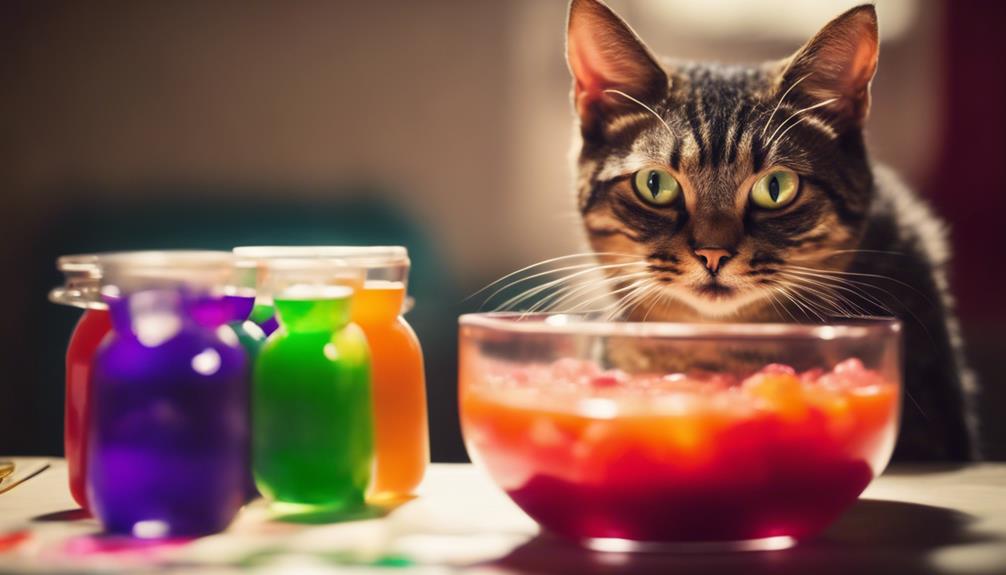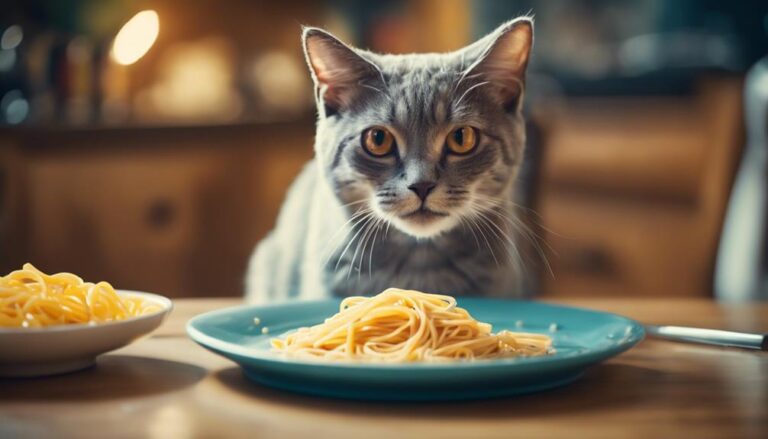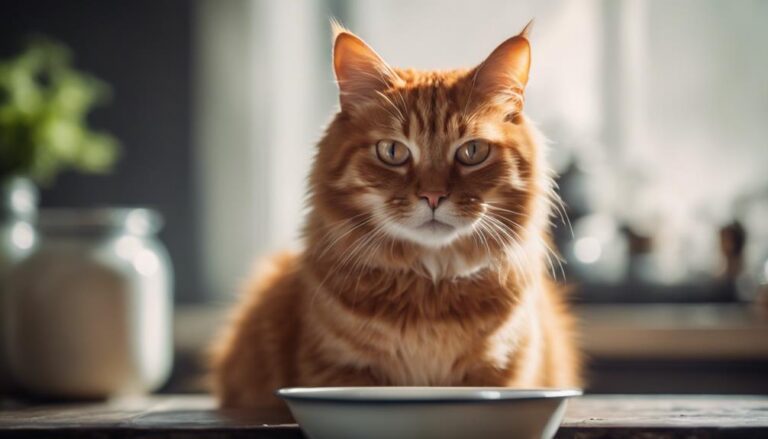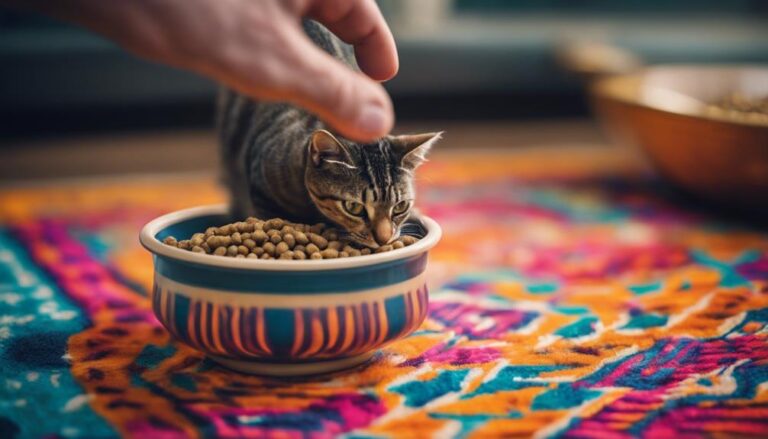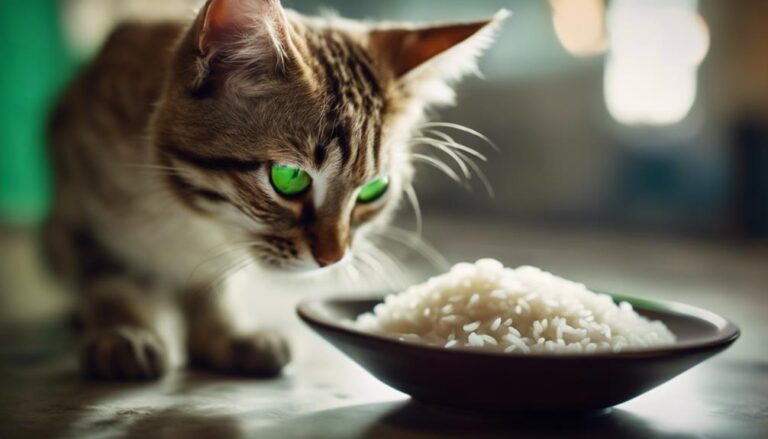If you're wondering whether cats can indulge in Jello like their human counterparts, there are some important considerations to keep in mind. While the colorful, wobbly dessert may seem harmless, the ingredients in Jello may not align with your feline friend's dietary needs. Before you decide to offer your cat a taste of this jiggly treat, let's delve into the potential risks and implications of feeding cats Jello.
Potential Risks of Feeding Cats Jello
Feeding cats Jello can pose significant risks due to its high sugar content and potential harmful additives. While cats may enjoy the wobbly texture and sweet taste of Jello, it's crucial to consider the health implications.
Cat treats should be chosen carefully, as Jello contains gelatin, which can be derived from animal collagen. The artificial colors and flavors present in Jello can be harsh on cats' digestive systems, leading to stomach issues or allergies. Additionally, the high sugar content in Jello can contribute to obesity and diabetes in cats if consumed regularly.
Moreover, sugar-free Jello may contain xylitol, a sweetener that's toxic to cats and can result in severe health issues. To ensure your feline friend's well-being, it's best to opt for unflavored, pure gelatin as a safer alternative to Jello when considering treats for your cat.
Sugar Content in Jello & Cat Health
Hey there, let's talk about the sugar content in Jello and how it impacts your cat's health.
Cats aren't equipped to handle high sugar levels, which can lead to various health issues like obesity and diabetes.
When considering treats for your feline friend, opt for sugar-free alternatives to keep them healthy and happy.
Cat Digestion of Sugar
Understanding how cats process sugar, especially when it comes to the sugar content in Jello, is crucial for maintaining their health and well-being. Here are some key points to consider:
- Cats lack sweet receptors and don't require sugar in their diet.
- High sugar content in Jello can lead to obesity and diabetes in cats.
- Xylitol, a sugar substitute in sugar-free Jello, is toxic to cats and can cause severe health issues.
- Cats shouldn't consume foods with high sugar content like Jello to maintain optimal health.
Monitoring sugar intake is essential to prevent digestive problems and maintain a balanced diet for cats. Be mindful of the sugar levels in Jello and other treats to ensure your feline friend stays healthy.
Health Risks From Sugar
Considering the significant sugar content in Jello and its potential health risks for cats, it's important to be mindful of the impact of sugar on feline health. Cats' health can be adversely affected by high sugar intake, leading to issues such as obesity and diabetes.
Since cats are obligate carnivores and lack sweet receptors, foods like Jello with artificial sweeteners can be harmful. Xylitol, commonly found in sugar-free Jello, is toxic to cats and can cause severe health problems.
To maintain your cat's well-being, it's best to opt for treats that align with their carnivorous nature and avoid sugary options like Jello altogether. Prioritizing your cat's health by steering clear of high-sugar foods will help prevent potential health complications.
Sugar-Free Alternatives for Cats
When exploring sugar-free alternatives for cats in consideration of the sugar content in Jello and its impact on feline health, it's crucial to prioritize their well-being by avoiding harmful ingredients like xylitol. When choosing sugar-free options for your cat, keep the following in mind:
- Opt for natural treats like small amounts of plain cooked meat or fish.
- Consider offering fresh fruits or vegetables as occasional snacks.
- Look for specialized cat treats with limited ingredients and no added sugars.
- Consult with your veterinarian for safe sugar-free alternatives for your cat's diet.
Always ensure that any treats or food items you offer your cat are free from xylitol to prevent any potential health risks.
Artificial Sweeteners & Cat Toxicity
If your cat consumes Jello containing xylitol, a highly toxic artificial sweetener, immediate veterinary attention is crucial to prevent serious health complications. Xylitol, commonly found in sugar-free Jello, can be extremely harmful to cats. Ingesting xylitol can lead to a rapid release of insulin in your cat, causing a dangerous drop in blood sugar levels (hypoglycemia). This drop can result in symptoms such as vomiting, lethargy, coordination problems, seizures, and in severe cases, liver failure or even death.
Always be diligent in checking ingredient lists for xylitol or any artificial sweeteners if your cat consumes any human food products, including Jello. If you suspect your cat has ingested xylitol, contact your veterinarian immediately for guidance. Remember, xylitol isn't only toxic to cats but also poses a significant health risk to dogs. It's crucial to keep all products containing xylitol out of reach of your pets to prevent accidental ingestion and potential health complications.
Citric Acid Sensitivity in Cats
After addressing the risks associated with artificial sweeteners like xylitol in Jello for cats, it's important to now highlight the potential sensitivity that cats have to citric acid found in such products. Cats can be sensitive to citric acid, which can lead to various digestive issues. Here are some key points to consider:
- Cats can experience upset stomach or vomiting due to citric acid found in Jello.
- The presence of citric acid may disrupt the pH balance in cats' digestive systems, causing discomfort.
- Cats lack the necessary enzymes to efficiently break down citric acid, making digestion challenging.
- Excessive consumption of citric acid can irritate cats' gastrointestinal tract, potentially resulting in diarrhea or gastrointestinal upset.
It's crucial to be mindful of the citric acid content in foods like Jello when considering what to feed your feline companion. Keep in mind that avoiding high citric acid foods can help prevent digestive disturbances in cats.
Signs of Jello Allergies in Cats
To recognize potential signs of Jello allergies in your cat, observe for symptoms such as vomiting, diarrhea, or lethargy. Cats may show allergic reactions to Jello, which can manifest as itching, skin redness, or swelling. If your cat exhibits persistent scratching or grooming after consuming Jello, it could be a sign of an allergy. In severe cases, cats may experience difficulty breathing or swelling of the face due to Jello allergies. It's crucial to pay attention to any unusual behaviors or physical changes in your cat after ingesting Jello.
If you notice any of these signs of an allergic reaction in your cat, it's essential to seek immediate veterinary care for proper evaluation and treatment. Your veterinarian can provide guidance on managing your cat's allergies and recommend suitable alternatives to Jello to prevent future allergic reactions. Remember, your cat's health and well-being should always be a top priority when introducing new foods or treats.
Cat-Friendly Treat Alternatives to Jello
Looking for safe treats for your feline friend? Consider opting for healthy snack options like homemade cat treats made from chicken, tuna, or salmon. These alternatives provide a delicious and nutritious choice that can cater to your cat's dietary needs.
Offering homemade cat treats ensures that your pet enjoys a tasty snack without the potential risks associated with Jello.
Safe Treats for Cats
For cats, exploring safe and tasty treat alternatives to Jello is essential for their overall health and happiness. When considering treats for your feline friend, keep their obligate carnivore nature in mind. Here are some options to consider:
- Homemade cat treats made from chicken, tuna, or salmon
- Catnip for a fun and stimulating experience
- High-quality commercial cat treats with natural ingredients
- Wet cat food as a delightful and appropriate treat option
Focus on providing treats and foods that align with your cat's dietary needs to ensure their well-being and avoid offering them Jello. Your cat will thank you for these delicious and safe alternatives!
Healthy Snack Options
Exploring cat-friendly alternatives to Jello involves considering healthy snack options that cater to feline dietary needs. When it comes to pet care, homemade cat treats made from ingredients like chicken, tuna, or salmon are excellent choices. These treats offer nutritional value and can be given in small amounts to keep your cat satisfied.
Additionally, catnip can provide a fun and stimulating experience for your feline friend without the need for Jello. Opting for high-quality commercial cat treats with natural ingredients is another great substitute. Offering wet cat food as a delightful treat is also a cat-friendly alternative that ensures your pet receives proper nutrition.
Homemade Cat Treats
Consider whipping up some homemade cat treats using ingredients like chicken, tuna, or salmon as a healthier alternative to offering Jello to your feline companion. When preparing cat treats, opt for natural ingredients to ensure your pet's safety and well-being.
Here are some cat-friendly treat alternatives to Jello:
- Homemade chicken cat treats
- Tuna-flavored homemade cat treats
- Salmon-based cat treats
- Catnip-infused homemade treats
These options not only cater to your cat's dietary needs but also provide a delicious and nutritious snack. By focusing on natural ingredients in homemade cat treats, you can promote your cat's overall health better than with processed snacks like Jello.
Frequently Asked Questions
What Happens if a Cat Eats Jelly?
If a cat eats jelly, it may struggle to digest it properly due to their unique digestive system. The high sugar in jelly can lead to health issues like obesity and diabetes. Jelly's texture may also pose a choking hazard.
Why Do Cats Like Gelatin?
You're curious about why cats like gelatin. Cats are drawn to gelatin due to its bouncy texture, mimicking prey movements. It engages their playfulness and hunting instincts. The wobbly consistency is a sensory experience that sparks their interest.
What Sweets Are Toxic to Cats?
Avoid feeding cats sweets like chocolate, grapes, raisins, caffeine, onions, garlic, chives, macadamia nuts, alcohol, xylitol, sorbitol, and aspartame. These can be toxic, causing various health issues. Stick to cat-friendly treats to keep your furry friend safe and healthy.
How Do You Give a Cat Gelatin?
To give a cat gelatin, offer small amounts as a treat, mix it with wet food or in homemade meals. Use meat-based gelatin without sugar or sweeteners. Limit to 1/2 teaspoon daily. Cats enjoy gelatin made from beef or bone broth.

